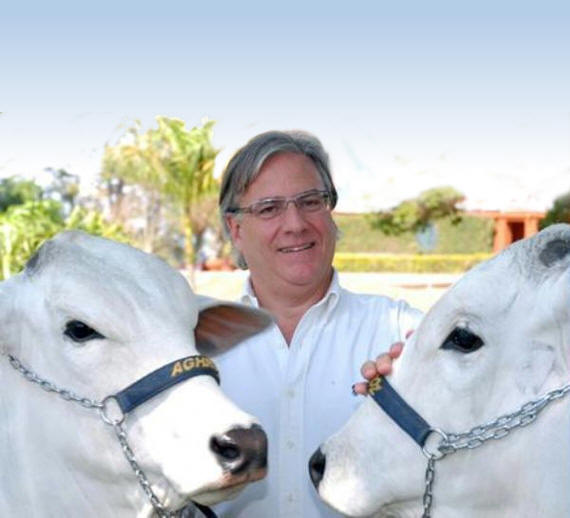Learn about the
incredible practices of a man born and made in the world's largest food
company.
In 1866, a
pharmacist named Henri Nestlé came up with the idea of mixing milk
with wheat flour and sugar to create a food supplement that would feed
babies whose mothers were unable to breastfeed them. That was how the
Nestlé company came to be in the Swiss city of Vevey, and went on
quickly to expand throughout the world. Given the nature of its first
product, and as the name Nestlé means “small nest” in Swiss German,
it was only fitting that the logo chosen by the company to identify itself
would be an illustration of two chicks in a nest being fed by their mother.
In the 144 years since, this nest grew to hold a number of characters that
are a long way from that endearing image of baby birds.
One of the
privileged tenants of the nest is a man by the name of Ivan Fábio de
Oliveira Zurita. He was born 56 years ago in Araras (in the
Brazilian state of São Paulo), the very city where Nestlé opened its
first Latin American factory back in 1921, and where Zurita’s
father and grandfather were also born. Curiously enough, the factory was
built on Zurita Avenue, named in honor of our character’s grandfather.
Iván Zurita joined Nestlé in 1972, quickly climbing to the
highest positions in the company: from Brazil he went on to work in
the company's Chilean, Argentinean, Central American
and Mexican subsidiaries. In Mexico he made it as high as
president and CEO. In 2001, he went back to his native Brazil, where
he was appointed president and CEO of Nestlé Brazil and has remained
in that position ever since.
In his
capacity as president of Nestlé Brazil he's been awarded several
prizes and honors. Among these is the “Business Leader” distinction, awarded
last October by the magazine Carta Capital, which selected him as one
of “Brazil's most admired entrepreneurs and executives” (further down
we'll see just how well Zurita does in both categories). At the award
ceremony, national president Luiz Inácio Lula da Silva and several of
his ministers were present.
A month
later, in the offices of Nestlé's factory in Araracuara (a
neighboring city of his native Araras), the municipal parliament
awarded Zurita the title of “Distinguished Citizen of Araracuara,” in the
presence of municipal legislators of every political party with
representation. The recognition was prompted by Nestlé's decision to
build a new factory in the city. According to the news coverage, when
Zurita received this distinction, he conveyed a message of greeting to
the population of Araracuara from the popular singer Roberto
Carlos, who had recently performed in a show sponsored by Nestlé.
In 2001,
the Rio de Janeiro parliament had also named him distinguished citizen of
that state, recognizing him “for services rendered to the country.”
The
Afro-Brazilian Social and Cultural Development Association (Afrobras)
also decorated him, along with a group of other people, for contributing to
promote “values such as respect for diversity, tolerance and equal
opportunities for all, and his contribution to the moral and social
improvement, and socio-economic, cultural and educational advancement of
Afro-Brazilians.”
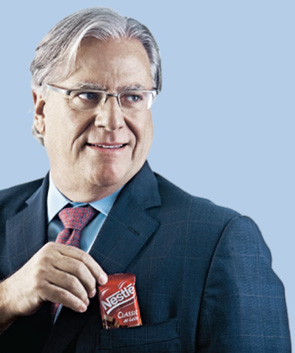 |
Zurita CEO |
Is
Zurita's performance as president of Nestlé Brazil really worthy
of all the honors bestowed upon him? We seriously doubt it, and are rather
of the idea that some of the awards and titles should be reconsidered. Let's
go over some facts:
·
When
Zurita was appointed president of Nestlé Brazil, one of his first
executive acts was to fire 800 workers, only to later hire nearly the same
number of employees. This measure was seen as a direct demonstration of
power. “A lot of people in there are afraid of Zurita,” a supplier
told a reporter of Portal Exame magazine at the time.
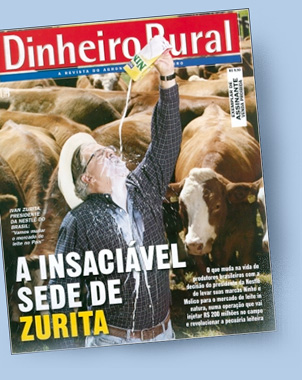
-
In
2008, for the second time in less than a year, Nestlé Brazil was
fined for reducing the weight content of some of its products - for
example, its product Neston 3 Cereais was cut from one kilo to
900 grams. In a letter to Elio Gaspan, the journalist who
reported the product tampering, Zurita claimed the fines were
subsequently cancelled.
-
Last May, Nestlé Brazil was
fined by the Labor Ministry for violating the “Conduct Adjustment and
Work Environment Terms” agreement, signed in 2007 with the union, in
which the ministry acted as performance guarantor. (See
Ministry of Labor fines Nestlé
for forcing workers to work long hours)
-
Also
last year, to promote the brand Ninho (nest in Portuguese), and
carried by his irrepressible histrionics, Zurita posed for a
controversial photograph featured in the cover of the May issue of the
magazine Dinheiro Rural, which readers found appalling.
So, his
record as a CEO can hardly be described as commendable.
Zurita businessman
Zurita
is also a successful businessman. It all started when he decided to purchase
a ranch in Araras to breed premium Simmental and Nelore cattle, with
animals worth as much as one million reais (approximately 581,000 US
dollars). In order to buy the ranch, Zurita borrowed directly from
the coffers of Nestlé, with the approval of Nestlé’s then
global president Peter Brabeck. “I'm friends with Brabeck and
he knew that this was my dream,” Zurita declared. As far as we know,
no other Nestlé employee has been given the chance to make their
dream come true, neither before nor after Zurita’s purchase,
regardless of how modest the dream, not even one as modest as not losing
their job.
As told by
Zurita himself, every Friday he sheds his suit, shoes and ties in
São Paulo and heads out to Araras all geared up in his rancher
outfit. He now owns the company Agrozurita, which has an annual
turnover of 70 million reais (some 40.66 million US dollars). Agrozurita
also breeds prime cattle, operates a sugar cane alcoholic beverage (cachaça)
distillery that produces Cachaça do Barão1,
markets a line of meat products, and grows oranges for industrial purposes.
In
addition, Zurita has been organizing cattle auctions for some years
now. One of his last auctions took Araras by storm, as 1,500 guests
flocked to the city by land and air, including in 32 helicopters and 19
planes. Taking advantage of the connections that his position at Nestlé
affords him, Zurita conducts what he calls a “marketing of business
relations.” In addition to numerous entrepreneurs, his cattle auctions are
attended by a constellation of show biz celebrities, such as the famous TV
presenters Fausto Silva, Ratinho, Hebe Camargo
and Ana Maria Braga, the comedian Tom Cavalcante, and the
well-known children’s performer Xuxa, among others.
Some of
these stars are also hired by Nestlé for its advertising campaigns.
This is the case of Pelé, for example, who is representing the
transnational corporation through 2014 as sponsor of the Brazilian soccer
team, with an annual investment of 400 million reais (about 232.35 million
US dollars). Another example is the singer Roberto Carlos, who has
appeared as spokesperson in Nestlé's advertising campaigns and
regularly attends the auctions held by Agrozurita. Not only that,
Roberto Carlos is one of the shareholders of Agrozurita and owns
of some the breeding cattle.
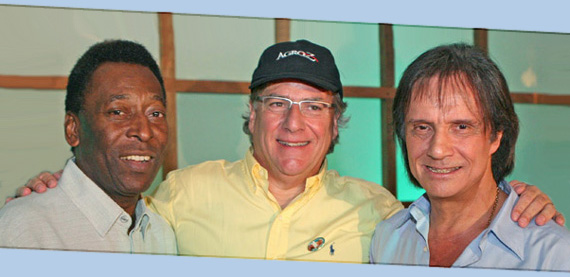
Another
marketing activity conducted on behalf of Agrozurita is the “Baron
Brotherhood,” formed by a hundred celebrities and powerful individuals
from the world of business, including Ratinho (who owns cattle
“housed” in Zurita's ranch and travels every weekend to Araras
in his private jet to see his animals) and Benjamín Steinbruch (CEO
of the steel company Companhia Siderúrgica Nacional). The group meets
every Tuesday at the Agusta club, owned by entrepreneur and playboy
Alvaro Garnero, to drink cachaça distilled in an old property owned
by the president of Nestlé.
Zurita
has apparently achieved an aspiration expressed by Roberto Carlos in
his well-known pop song, where he dreamt of having “a million friends.”
Could his position as president of Nestlé have anything to do with
this? The company invests some 203 to 262 million US dollars a year
in advertising in Brazil, so we wouldn't be far from the truth if we
ventured that Zurita took advantage of the “trickle down” effect of
this fabulous figure to promote his own businesses and, as we'll see below,
feed his enormous ego.
“I'm the
law”
On Feb. 2,
Zurita celebrated his birthday in the exclusive Café de la Musique,
in the city of São Paulo. His guests greeted him all decked out
as cowboys under a sign that read “A little over 5 decades.” The party was
entertained by the country music duo Fernando & Sorocaba, which
normally charges 70,000 US dollars per performance.
The
birthday boy - who arrived in a suit and tie, but quickly changed into a
plaid shirt and cowboy hat - was delighted when his guests acknowledged his
power by pinning a sheriff star on his chest. The star and title of sheriff
were also featured as the birthday cake’s decoration. Such arrogance and bad
taste - most likely born from the power of money -may explain the incredible
developments that took place some months later.
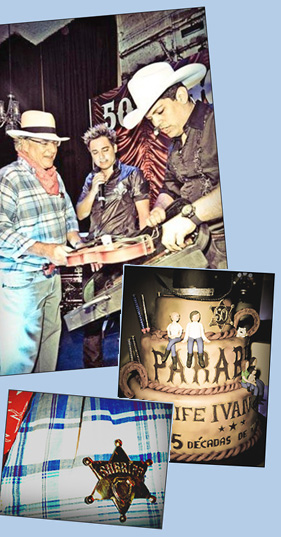
An outlaw
sheriff
It only
took 190 days for the new sheriff to show his disregard for the law and his
total lack of consideration towards his fellow human beings. In mid August,
the Mobile Rural Control Group, a team acting under the Labor and
Employment Ministry, conducted an operation with the support of both the
Federal and the Military Police, in response to a report by the
Araras Rural Workers Union. Through this action, the group discovered
a number of work irregularities in several orange plantations in the state
of São Paulo, more specifically in the cities of Aguaí,
Araras, Conchal and Mogi Guaçu. Two of these plantations,
one in Aguaí and another in Araras, are owned by Agrozurita.
In the
Aguaí plantation - Campo Alegre or ‘Happy Field’ - the inspectors
found 55 people working without being properly registered as workers,
pursuant to the law. Moreover, the workers had no drinking water or sanitary
facilities. The inspectors also found that the workers lacked proper
cafeterias and adequate protective gear, besides other irregularities
detected. Another serious infraction found was a fraud being committed in
the workers’ pay, as they were being cheated through deliberate
miscalculation of their wages. Instead of calculating wages based on 27-kilo
sacks of oranges, as stipulated, the pay was being calculated on the basis
of 34-kilo sacks. According to the inspectors, a foreman tried to clear out
the workers before the inspection took place, thus proving that he was fully
aware of the illegal working conditions in the plantation. At the Araras
plantation (Santa Cruz), inspectors found that the workers also
lacked protective gear and sanitary facilities. A total of 20 infraction
orders were issued against Agrozurita.
Spokespersons for Agrozurita told the press that within days they
would be submitting documentation to the authorities evidencing that the
working conditions at the two plantations were fully compliant with legal
provisions. However, in a summary report issued some days later, the Public
Labor Ministry2
denied that Agrozurita had presented any documents showing that the
workers were properly registered, and that in addition to that irregularity,
the company was being charged with an attempt to prevent the inspection,
payment fraud, and precarious working conditions in its orange plantations.
A settlement hearing was set for Aug. 29, the result of which has not been
disclosed.
Alarming
Both as a
CEO and as a businessman, Zurita has persistently breached labor laws
and has become an expert in reaching agreements with the Labor Ministry to
benefit his situation. This, among other things, puts into question his
capacity to properly apply the principles of “shared values” that Nestlé
so proudly boasts of.
The
severity of the situations and incidents described above are cause for great
alarm, because what’s at stake here is the fate - no less - of the 15,000
men and women who work in Nestlé Brazil. The problem is an
absence of morality, honesty and ethics, and adherence to such values cannot
be shed as one shed outfits. These values are the same whether you’re
wearing a suit and tie or jeans and cowboy boots.
In the face
of these incidents and situations, those who have awarded and honored
Zurita should withdraw the honors bestowed on him. Unless, of course,
they choose to pretend they don’t see them or look the other way.
Afrobras, for example, should look into how many Afro-Brazilians have
been cheated in their pay in Zurita’s orange plantations. The cities
who have made him a distinguished citizen should strip him of that honor.
Nestlé’s
shareholders, however, face a much more complicated dilemma. They could
look the other way, and tolerate Zurita’s actions as the antics of
Nestlé’s own enfant terrible. But if they were to go that
way - or if they were to ignore the problem -, the message they would be
sending out loud and clear, taking into account that Zurita was able
to double sales in Brazil, would be that economic results are the
only thing that really matters to Nestlé and its shareholders. If
that’s really the case, we will be forced to publicly denounce it. And, at
the same time, we will have to announce that the company has no business
talking of corporate social responsibility.
